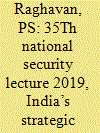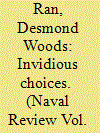|
|
|
Sort Order |
|
|
|
Items / Page
|
|
|
|
|
|
|
| Srl | Item |
| 1 |
ID:
170765


|
|
|
|
|
| Summary/Abstract |
We live in a world in which a post-cold war order is still in the making, as the sole super power shares the global stage with multiple state actors of varying weights, jostling for space to assert their national aspirations.
In this complex environment, India’s foreign policy seeks to maximise India’s political and economic space to further its global ambitions. This includes sustaining the vibrant India-US strategic partnership, forged since the early 2000’s, even while preserving the traditionally strong relationship with Russia from the decades of the Cold War. A comprehensive partnership has also been developed with China, though recent differences have somewhat dimmed its intensity. India needs a combination of domestic capacity building and external partnerships to reconcile the contradictory pulls of strategic cooperation and competition with China. Relations with the US, Russia, Japan and Europe are also elements of this effort. India’s multilateral activism in G-20, BRICS and SCO serve to enhance its room for manoeuvre in the dynamics of the US, Russia, China triangle. India’s strategy in the India-Pacific seeks to promote bilateral, plurilateral and multilateral partnerships in search for a cooperative and sustainable architecture in the region that promotes objective of a multi-polar order.
|
|
|
|
|
|
|
|
|
|
|
|
|
|
|
|
| 2 |
ID:
138002


|
|
|
| 3 |
ID:
096115


|
|
|
|
|
| Publication |
2010.
|
| Summary/Abstract |
Previous work on the dynamics of conflicts where we see terrorism has tended to focus on whether we see shifts in attack mode following government countermeasures. We contend that many factors other than counterinsurgency can influence whether groups resort to terrorism, including competition between groups, as well as their relationship to public opinion and other political events. Hence, understanding terrorist tactics in prolonged conflicts with multiple actors requires us to consider a more general framework of innovation, imitation, competition and dependence between actors. We use disaggregated data on terrorist attacks, counterterrorism and public opinion in the Israel-Palestine conflict to jointly evaluate predictions derived from several conventional theories of strategic behaviour. We find that the strategic calculus of Palestinian groups is complex and cannot be treated as time invariant. Our results suggest that factors such as the degree of public support, inter-group competition, the anticipation of countermeasures and non-trivial non-violent payoffs have an observable effect on the strategic behaviour of the Palestinian groups, and that structural relationships are often far from constant over time.
|
|
|
|
|
|
|
|
|
|
|
|
|
|
|
|
|
|
|
|
|